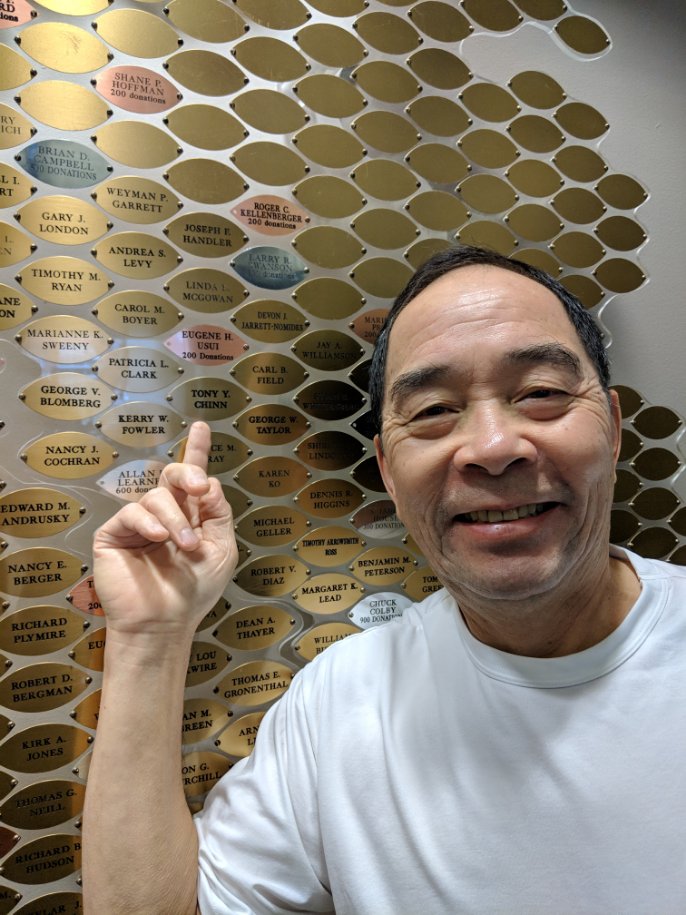By John Yeager
Senior Media Content Strategist/Bloodworks Northwest

Tony Chinn, a long-time BloodworksNW Donor at our BloodworksNW Central location on Terry Avenue (Photo provided by Bloodworks)
The face of Seattle is changing right before our eyes. Want proof? Take a walk through the Amazon campus. Our population is growing, becoming more diverse and younger. The Puget Sound Regional Council tells us that people of color make up 35 percent of our area’s population today.
That’s more than twice what it was in 1990. And while the impact on the local economy has been well documented, the impact on the local blood products industry’s ability to maintain an adequate blood supply, especially as it applies to people of color, is cause for growing concern.
As the Puget Sound area grows, Bloodworks Northwest, the area’s leading blood center and research center, says the need for a more diversified blood supply here in the Pacific Northwest is growing, too. So Bloodworks is reaching out to donors of all ages (especially Asian donors) to help them meet the increasing demand for blood. They’re also looking for financial contributions in order to save lives through transplantation and transfusion.
Bloodworks faces continuing challenges in getting more donors of Asian heritage to donate. And the need is great. Bloodworks needs more than 900 units of blood EVERY SINGLE DAY simply to keep up with demand.
Dr. Yanyun Wu, Chief Medical Officer at Bloodworks Northwest, said, “Although blood donations from the Asian community are increasing, they are still low compared to other ethnic groups in our area. We want people to donate for many diseases and conditions, including transplantations and to help stem cell recipients. We need red blood cells and platelets, and we need as many people from diverse ethnic backgrounds to donate as possible.”
In some cases, Dr. Wu said, “Because blood from the local Asian community is so low, we’re often forced to reach out to states like Hawaii for the right blood to match an Asian patient because there are simply more Asians living there.” Dr. Wu says with the growing Asian population in the Northwest, there’s an increasing number of Asian patients needing blood transfusions. According to the latest numbers, more than 90,000 Chinese Americans live within a 25-mile radius of the Seattle area and that number is only expected to increase. Dr. Wu said, “The consequences of not meeting that need are literally a matter of life and death.”
Sometimes the story of one little girl can draw attention where numbers fail. The case of 3-year-old Zainab, a South Florida Pakistani girl suffering from a life-threatening disease who needs a special kind of blood, drew national attention to the need for finding a suitable donor with a rare blood type. OneBlood, a South Florida blood center, has put out the call for possible matches that reached all the way up here to the Pacific Northwest. They’re looking for a donor exclusively of Pakistani, Indian, or Iranian descent, but so far, no suitable donor has been found.
But other challenges linger in the blood products industry. The age of most donors continues to climb. And as their donor base continues to age, Bloodworks says it is also looking for younger Asian donors, especially millennials, to step up as well. As a result, they’ve developed a new mobile app. Bloodworks says it’s now easier than ever to make a donation appointment. They’re asking donors to text the word “bloodapp” to 91985. Developers of the new app say millennial donors appreciate the feature of the app that encourages donors to form donor “communities.” Their research has told them that donating as part of a community resonates with younger donors.
Juan Cotto, Bloodworks’ Director of Social Impact, says money can be a lifeblood, too.
“Bloodworks Northwest is committed to the cause of diversity in the blood supply because it’s a way to serve all communities here in the Pacific Northwest. The most important role we have in our social impact mission is not to find minority blood donors because we know they are out there. The most important role we have is to inform minority blood donors. That is what social impact is about.” Cotto added, “As in the tech industry, financial contributions stimulate innovation, especially in minority communities, and funding for research gives Bloodworks the ability to do just that.”
However you donate, both Dr. Wu and Cotto agree, the consequences are life-saving. Experts say, whatever your ethnic background, chances are that one in three of us will need a transfusion at some point in our lives.


